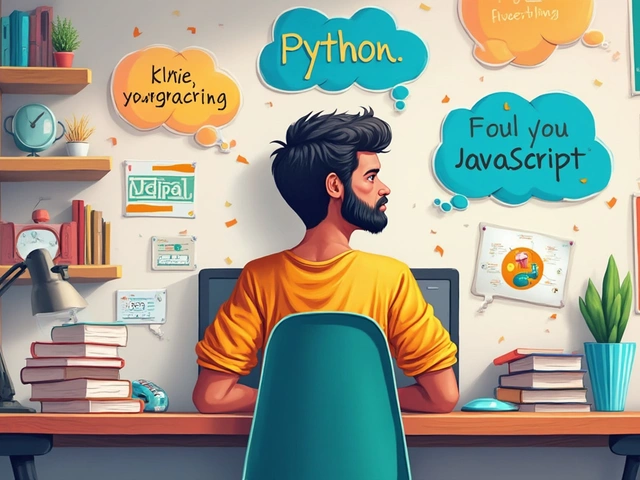So, you're thinking about diving into the world of coding? That's awesome! Picking up a programming language can totally open up a world of new opportunities, whether you're looking to switch careers, build cool apps, or just try something new. But let's be real—choosing which language to start with can feel like standing in front of a giant buffet with no idea what to eat first.
Understanding the options is key. Some languages are like the comfort food of coding—easy to start with and almost universally liked. Think Python. It's like the grilled cheese of programming languages—simple, classic, and versatile. On the other hand, if you're eyeing something more specialized—like making those mind-blowing websites—you might want to check out JavaScript. It's the go-to tool for web developers.
- Why Learn Programming?
- Top Languages for Beginners
- Specialized Languages for Specific Goals
- The Future of Coding: Trends to Watch
- Practical Tips for Picking Your Language
Why Learn Programming?
Learning to code is seriously like getting the ultimate toolkit for the digital age. It's about more than creating apps or working in tech. It's about becoming digitally literate in a world where technology drives everything from grocery shopping to space exploration. So, why learn coding? It's because it's like learning a new superpower that opens doors everywhere.
Let's talk numbers for a second. Did you know that the demand for software developers is expected to grow by about 22% over the next ten years? That's much faster than most other jobs! With coding skills under your belt, you're not just stuck with one job title—you can hop across various fields like web development, data science, or even cyber security.
But it's not just about job opportunities. Coding helps you think differently. It's about problem-solving, thinking logically, and breaking down big problems into bite-sized pieces—skills that are pretty handy in everyday life too! Plus, there's something incredibly satisfying about building something from scratch and watching it come to life.
Another cool thing is that you don't need a degree to get started. With so many online resources and coding classes out there, you can learn at your own pace. Websites like Codecademy, Coursera, or even YouTube tutorials can take you from zero to hero, whether you want to dabble in programming languages or go pro.
Also, knowing how to code means you can turn your ideas into reality. Got an idea for the next hit mobile game or a web app that solves a real-world problem? With the right tech skills, you can make it happen. So, jumping into coding isn't just a trend—it's a seriously useful skill set in today's tech-driven world.
Top Languages for Beginners
So, you're new to this coding world and wondering which coding language to start with? No worries. Picking the right one is crucial, and it all depends on your goals and what you're curious about exploring.
First up, let's talk about Python. If you've heard it's the go-to language for beginners, you're spot on. Python is super user-friendly with its clean and straightforward syntax. It's like writing in English, almost! Whether you're interested in web development, data science, or even automating boring stuff on your computer, Python's got your back. No wonder it's been used in everything from Instagram to Spotify.
Next, we have JavaScript. If the idea of building cool websites or dynamic web apps grabs your attention, JavaScript is the way to go. It's everywhere on the web and forms the backbone of many interactive online experiences. Plus, if you hang around long enough, you'll find that learning JavaScript is almost a rite of passage for anyone serious about front-end web development.
Here’s something interesting: according to the 2025 Developer Survey, Python and JavaScript are consistently ranked as the top two languages for new programmers. People love them because they open up a lot of doors without too steep a learning curve.
For those into game development, consider exploring C#. It's powerful and used in game engines like Unity, which drives some of the coolest games out there. While it's a bit more structured, once you get the hang of it, C# can be incredibly rewarding.
| Language | Best Used For | Ease of Learning |
|---|---|---|
| Python | General, Data Science | Very Easy |
| JavaScript | Web Development | Easy |
| C# | Game Development | Moderate |
Still not sure where to start? Try a few tutorials online in each language. Most offer free resources where you can dabble a bit before diving deeper. This way, you'll get a feel for what clicks with you.

Specialized Languages for Specific Goals
Alright, you've already got a handle on the basics of coding, and now you're looking to level up. It's kind of like moving from cooking pasta to mastering sushi—fun and seriously rewarding! If you have specific goals in mind, whether it's crafting complex algorithms or building the next viral app, there's a specialized programming language waiting for you.
Let's say you're fascinated by data and want to dig into data science or machine learning; Python won’t disappoint. It’s been a big deal in the data world with libraries like Pandas and TensorFlow. But if your heart’s set on speed and performance, consider learning R. It's a favorite among statisticians.
If game design is more your thing, languages like C++ or C# might be your best buddies. These are powerhouses in the gaming industry, used in engines like Unity and Unreal.
For those dreaming about mobile, you've got options: Java is great for Android apps, while Swift is the go-to for iOS. Both languages are essential if you want to specialize in mobile development. Jumping into these ensures you tap into a huge market of smartphone users.
And guess what? JavaScript is an all-rounder when it comes to web development. But if you're looking into backend services and databases, languages like PHP and Ruby on Rails are worth a peek.
If you're wondering about job potential, here's a little peek at data:
| Language | Industry Usage (%) |
|---|---|
| Python | 95 |
| R | 80 |
| Java | 90 |
| JavaScript | 100 |
Choosing the right language depends on where your interests lie. Each has its niche, but remember, the skills you gain are versatile, and understanding one can make learning another a whole lot easier down the line. Happy coding on this exciting journey!
The Future of Coding: Trends to Watch
The tech world doesn’t sit still for long, and neither does coding. If you're thinking about future-proofing your skills, it's a good idea to keep an eye on some exciting trends that are shaping the industry. Spoiler: the demand for smart, efficient solutions isn't going anywhere.
One trend that's been rocketing upwards is artificial intelligence and machine learning. Super cool fact: these fields rely heavily on languages like Python and R. If you're interested in diving into the future of tech, AI is the place to be. Think about all those smart assistants we've got now—they're just the tip of the iceberg.
Web development is also changing at lightning speed. Keep an eye on JavaScript; it’s growing with frameworks like React, Angular, and Vue.js. If you're into making sleek, user-friendly websites, getting the hang of these can make you a hot commodity in the job market.
Tableau anyone? Here's a quick look at the expected growth for key tech fields in the next few years:
| Field | Expected Growth (2025-2030) |
|---|---|
| Artificial Intelligence | 36% |
| Web Development | 13% |
| Data Science | 15% |
Another biggie is the Internet of Things (IoT). As our gadgets get smarter and more interconnected, languages like C and C++ are being used to develop new solutions. Being part of this IoT wave can land you in the fast lane of innovation.
Finally, as everything becomes more digital, there’s a growing emphasis on cybersecurity. No surprise there! The more connected we become, the more crucial it is to protect our data. It's a field that's just waiting to explode and offers a solid path if you're interested in keeping the virtual world safe and sound.
So, if you're planning your next move in the coding world, these trends are definitely ones to watch. They’re not just passing fads; they’re paving the future road map for technology.

Practical Tips for Picking Your Language
Choosing the right coding language is like picking the right tool for a DIY project. Each language has its strengths, and the best one for you depends on what you want to create. Let's break it down and make this decision a little easier.
Start by asking yourself: what do I want to achieve with coding? If you're aiming for web development, you might want to lean towards languages like JavaScript or Ruby. These are widely used in the web space, and there's no shortage of resources and communities to help you out. Interested in data science? Python is your friend here. It's super versatile and has tons of libraries for data analysis.
Another big factor is the language's user-friendliness. Some languages, like Python, are great for beginners because of their simple syntax, which is easy to read and write. Others, like C++, can be more complex and might require a bit more time to wrap your head around.
Consider the job market too. Do a little homework on which skills employers are hunting for. A quick search might reveal that strong skills in Python and JavaScript can really boost your employability, thanks to the demand for web developers and data scientists.
- Check online coding communities and forums where people chat about their language of choice.
- Experiment with a few beginner projects in different languages to see what feels right for you.
- Look at GitHub or open-source projects to understand how your chosen language is being used in real-world applications.
Finally, don't stress too much about picking the "perfect" language. You'll likely end up learning more than one over time. Remember, coding is a journey, and it's the skills you develop that matter most.



